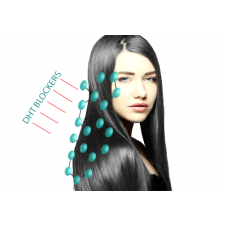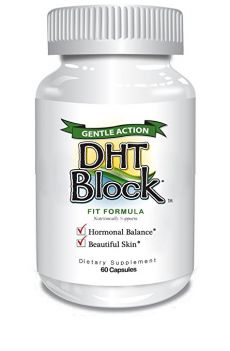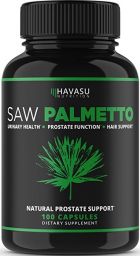Dihydrotestosterone (DHT) is a popular target for hair loss remedies. Here we will discuss how DHT blockers work and which might be the best to try to manage hair loss..

DHT and Pattern Baldness
Androgenetic alopecia is a hereditary type of balding that can affect both men and women (male and female pattern hair loss). A gene that has been found to play a major role in the reduction of hair growth with age is 5α-reductase. This enzyme converts testosterone into another steroid hormone, dihydrotestosterone (DHT). While DHT has many important functions in the body, higher levels of DHT are associated with hormone-related disorders such as benign prostate hyperplasia (enlarged prostate) and scalp hair loss. Though the exact mechanisms are not fully understood, DHT may cause hair loss by binding androgen receptors in hair follicles and inducing changes in gene expression in hair-producing cells.1,2
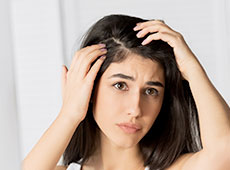

DHT Blockers Promote Hair Growth
Since higher DHT levels can lead to hair loss, it makes sense that lowering DHT levels can restore hair growth. This is the purpose of 5α-reductase inhibitors, also called DHT blockers. These bind to the enzyme 5α-reductase and render it inactive. The end result is that less testosterone gets converted to DHT, so testosterone levels in the bloodstream rise while DHT levels drop.
DHT blockers have proven to be effective in restoring hair growth, increasing hair counts, and slowing hair loss. If your hair has been thinning, a topical foam or ointment containing a DHT blocker may be your best bet for improvement.

Synthetic Drugs
Currently, there are two synthetic DHT blockers which are used to treat hair loss clinically: finasteride and dutasteride. If you live in the United States, you will only be able to get finasteride prescribed for your hair loss as that is the only DHT blocker approved by the FDA for that specific use. Dutasteride, which is newer, is currently only approved for use for hair growth in Japan and South Korea. However, it has been approved by the FDA to treat benign prostate hyperplasia, so it is possible that it will receive FDA approval for hair loss in the future.3,4
These pharmaceutical compounds can be taken orally or used in a topical solution. You will need a prescription in order to use them. If you have been prescribed finasteride, watch out for its possible side effects and let your doctor if you notice changes besides hair growth. An uncommon but sometimes-reported side effect that occurs in men is impaired sexual function, including decreased libido and impotence.5
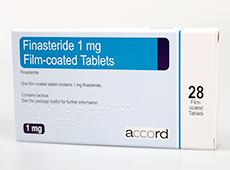

Natural Products
Traditional medicine practitioners in different cultures have used a variety of plants-based products as hair-loss remedies. Recent biochemical analyses have found that some plants do indeed produce molecules that act as 5α-reductase inhibitors. You can now find several hair-loss products made from plant extracts that contain naturally-occurring DHT blockers.
One of most effective of these is saw palmetto berry (Serenoa repens). Extract from this fruit is used in various supplements promoting men’s health. Clinical trials have demonstrated that taking saw palmetto berry extract orally can improve hair thickness, though an optimal dose has not yet been determined.6,7 Other products which have DHT-blocking activity and have shown initial promise for use for hair growth include safflower (Carthamus tinctorius) and seaweed (Grateloupia elliptica) extracts, pumpkin seed oil, and green tea.8-11
[1] Naito A, Sato T, Matsumoto T, Takeyama K, Yoshino T, Kato S, Ohdera M. Br J Dermatol. 2008 Aug; 159(2):300-305. “Dihydrotestosterone inhibits murine hair growth via the androgen receptor.” https://www.ncbi.nlm.nih.gov/pubmed/18547308
[2] Kwack MH, Ahn JS, Kim MK, Kim JC, Sung YK. BMB Rep. 2010 Oct; 43(10):688-692. "Preventable effect of L-threonate, an ascorbate metabolite, on androgen-driven balding via repression of dihydrotestosterone-induced dickkopf-1 expression in human hair dermal papilla cells." https://www.ncbi.nlm.nih.gov/pubmed/21034532
[3] Yim E, Nole KL, Tosti A. Curr Opin Endocrinol Diabetes Obes. 2014 Dec; 21(6)493-498. “5α-Reductase inhibitors in androgenetic alopecia.” https://www.ncbi.nlm.nih.gov/pubmed/25268732
[4] Said MA, Mehta A. Curr Urol Rep.2018 Jun; 19(8):65. “The Impact of 5α-Reductase Inhibitor Use for Male Pattern Hair Loss on Men’s Health.” https://www.ncbi.nlm.nih.gov/pubmed/29909472
[5] Hirshburg JM, Kelsey PA, Therrien CA, Gavino AC, Reichenberg JS. J Clin Aesthet Dermatol. 2016 Jul; 9(7):56-62. "Adverse Effects and Safety of 5-alpha Reductase Inhibitors (Finasteride, Dutasteride): A Systematic Review."
https://www.ncbi.nlm.nih.gov/pubmed/27672412
[6] Rossi A, Mari E, Scarno M, Garelli V, Maxia C, Scali E, Iorio A, Carlesimo M. Int J Immunopathol Pharmacol.2013 Oct-Dec; 25(4):1167-1173. “Comparitive effectiveness of finasteride vs Serenoa repens in male androgenetic alopecia: a two-year study.” https://www.ncbi.nlm.nih.gov/pubmed/23298508
[7] Prager N, Bickett K, French N, Marcovici G. J Altern Complement Med. 2002 Apr; 8(2):143-152. “A randomized, double-blind, placebo-controlled trial to determine the effectiveness of botanically derived inhibitors of 5-alpha-reductase in the treatment of androgenetic alopecia.” https://www.ncbi.nlm.nih.gov/pubmed/12006122
[8] Kumar N, Rungseevijitprapa W, Narkkhong NA, Suttajit M, Chaiyasut C. J Ethnopharmacol. 2012 Feb; 139(3):765-771. “5α-reductase inhibition and hair growth promotion of some Thai plants traditionally used for hair treatment.” https://www.ncbi.nlm.nih.gov/pubmed/22178180
[9] Kang JI, Kim SC, Han SC, Hong HJ, Jeon YJ, Kim B, Koh YS, Yoo ES, Kang HK. Biomol Ther (Seoul). 2012 Jan; 20(1):118-124. “Hair-Loss Preventing Effect of Grateloupia elliptica.” https://www.ncbi.nlm.nih.gov/pubmed/24116284
[10] Cho YH, Lee SY, Jeong DW, Choi EJ, Kim YJ, Jeong GL, Yi YH, Cha HS. Evid Based Complement Alternat Med. 2014; 2014:549721. “Effect of Pumpkin Seed Oil on Hair Growth in Men with Androgenetic Alopecia: A Randomized, Double-Blind, Placebo-Controlled Trial.” https://www.ncbi.nlm.nih.gov/pmc/articles/PMC4017725/
[11] Kwon OS, Han JH, Yoo HG, Chung JH, Cho KH, Eun HC, Kim KH. Phytomedicine. 2007 Aug; 14(7-8):551-555. “Human hair growth enhancement in vitro by green tea epigallocatechin-3-gallate (EGCG).” https://www.ncbi.nlm.nih.gov/pubmed/17092697/
Search the blog
Article Categories
- All Articles (95)
- Rating Charts (1)
- Beauty & Skincare (17)
- FAQ (0)
- Hair Care (9)
- Health & Wellness (12)
- Anti-Aging (4)
- Kid's Health (0)
- Makeup (2)
- Men's Health (2)
- Oral Care (3)
- Sunscreen (7)
- Skin Tools & Treatments (10)
- Supplements (26)
- Videos (0)

